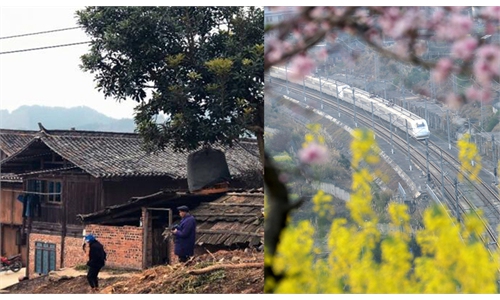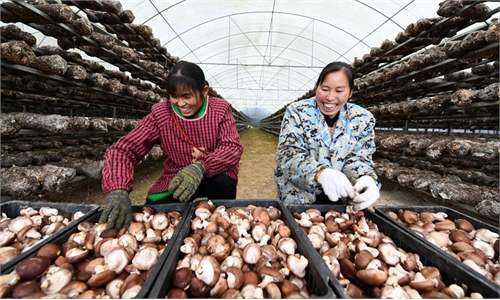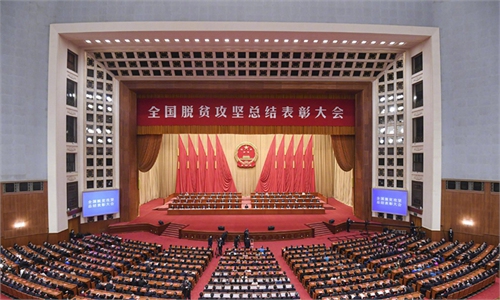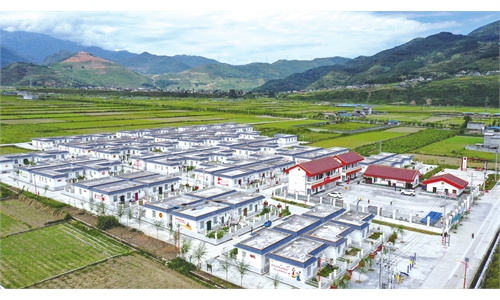IN-DEPTH / IN-DEPTH
American researcher documents China's poverty alleviation success, revealing the winning formula
Witnessing history
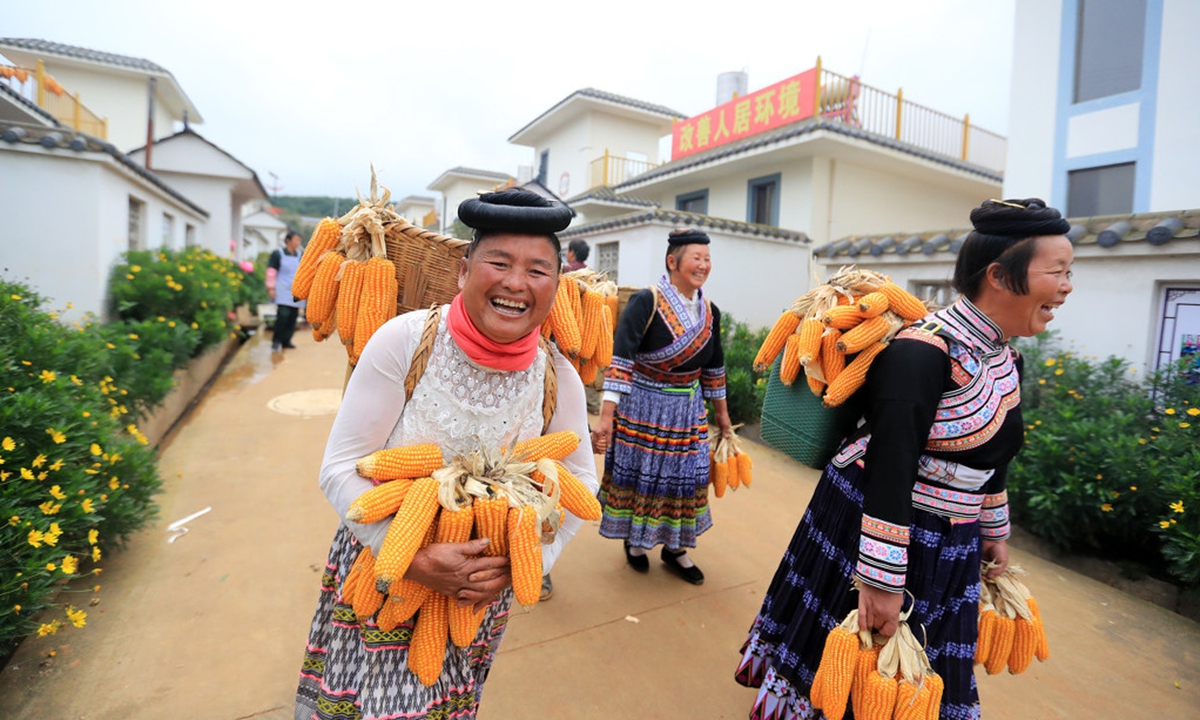
Villagers attend a wedding ceremony held in Xiaohaixin village, their new living community after poverty alleviation relocation, Xundian county, Southwest China's Yunnan. Photo: IC
Editor's Note:"When future historians write the chronicles of our time, a close-up story is likely to be China's targeted poverty alleviation," said Dr. Robert Lawrence Kuhn, chairman of The Kuhn Foundation and recipient of the China Reform Friendship Medal (2018), who has long been researching the poverty alleviation efforts in China.
Kuhn, 77, has been telling the world the China story for more than 30 years. He has published books such as How China's Leaders Think and The Inside Story of China's 30 Year Reform. He also went deep into the poor areas of China to produce the documentary Voices from the Frontline: China's War on Poverty.
Through onsite visits and filming, Kuhn gained a profound understanding of China's "targeted" poverty alleviation, and he believed that China's commitment and strong implementation of poverty alleviation are worthy of being studied and referenced by other countries.
Global Times (GT) reporter Zhang Mengxu interviewed this old China hand to understand why he spends so much time studying China's experience in fighting poverty, and why he made comments praising China's elimination of absolute poverty as an epic achievement.
GT: What do you think of China's eradication of extreme poverty? What does this mean for China and the world?
Kuhn: I have been telling China's story to the world for more than 30 years, and although China has many achievements, none has been as representative of the real China, and none has been so powerful in impact, as China's commitment to eradicate all extreme poverty in the country and China's systematic implementation to make it happen by the end of 2020.
China's poverty alleviation program is the best story to undermine biases and disrupt stereotypes about China. A good part of the reason is that foreigners have very limited knowledge of China's poverty alleviation commitment and campaign.
Over the past 30 years, intensely over the past 15 years, I have traveled across China, visiting over 100 cities with my long-term partner, Adam Zhu, for research, investigations, books and essays, television and documentary productions. Yet, after all that, as much as I thought I knew China, I did not appreciate all that is required for poverty alleviation until I started going on-location in poor regions, especially in remote mountainous villages. I had the opportunity to speak with poor villagers and hear their stories.
I have also found that, surprisingly, many Chinese urbanities do not appreciate how poverty alleviation is being conducted in rural areas of their own country, particularly, those born in the 1990s and 2000s. This is why I am committed to telling China's story of poverty alleviation to the world.
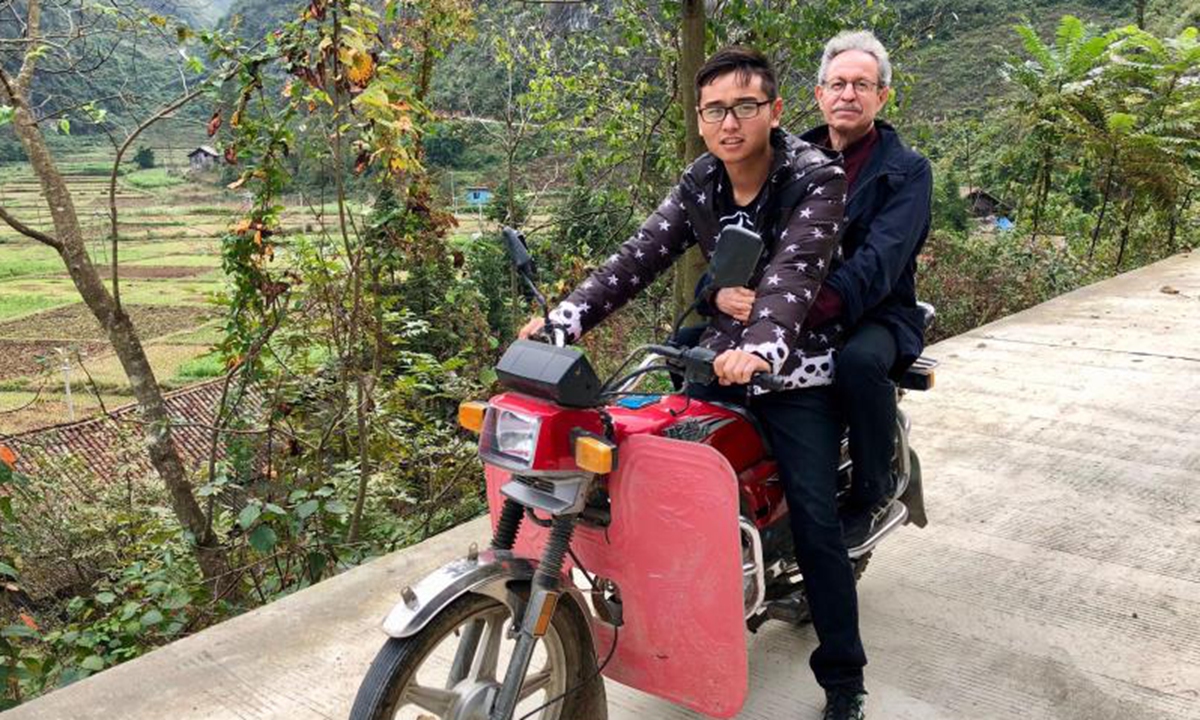
Dr. Robert Lawrence Kuhn (right) is investigating poverty alleviation work in Daijing village, Huishui county, Qiannan Bouyei and Miao Autonomous Prefecture of Southwest China's Guizhou Province. Photo: Courtesy of Dr. Kuhn
GT: You participated in the documentary Voices from the Frontline: China's War on Poverty last year. Could you share with us some of your experiences about visiting many provinces and cities in China when making this documentary?Kuhn: On July 31, 2019, PBS SoCal, the PBS flagship public television station in Southern California in the US, premiered my documentary on China's historic poverty alleviation campaign: Voices from the Frontline: China's War on Poverty, the first in-depth documentary about China's poverty alleviation campaign to be broadcast abroad. In May 2020 it was broadcast again in the US.
We met poor villagers, local officials, and special monitors - those being lifted out of poverty, those assigned to do the lifting, and those recruited to do the checking. The documentary provides a textured and intimate portrayal of China's poverty alleviation and the systems and organizations needed to implement it.
As much as I thought I knew China, I was startled to discover that every poor family in China has its own file, each with its "targeted" plan to lift each above the line of absolute poverty - that's millions of poor families with customized plans, each checked monthly, recorded on paper, and digitized for central compilation and analysis. That's millions of households!
Equally startling, young Party cadres are dispatched to impoverished villages to manage poverty alleviation for two years. But they were happy and excited, knowing they were contributing to China's national commitment to eradicate all extreme poverty and that their grassroots work would help their future careers.
One of the aspects of China's poverty alleviation campaign that impressed me the most was the system put in place to mitigate fraud, called "third-party evaluation." For example, our documentary focused on a team of professors and students from Southwest University in Chongqing. It was as if they were on a military mission. Authorized and trained by the central government, they traveled more than 300 kilometers from their university deep into rural Sichuan Province. The governing idea is that since the third-party evaluators would be coming from completely different regions, they would not likely know any of the officials whom they would be evaluating and thus not be swayed by personal relationships.
After watching our film, one not unsophisticated American said, "I wasn't expecting a positive outcome. I guess there are so many negative reports about China that we assume they couldn't care less about their underclass. My opinion was changed."
Applicable experience to the world
GT: What are the most important experiences in China's poverty alleviation work?
Kuhn: It was on November 3, 2013, when President Xi Jinping was visiting Shibadong village and he first proposed the concept of "targeted" or "precision" poverty alleviation.
"Targeted" means individualized procedures and programs, with the policies to support them, including standardized definitions of poverty, identification criteria of poor people, and customized plans and programs to bring each out of poverty.
The success of China's targeted poverty alleviation campaign, bringing 10 to 14 million people per year out of poverty since 2013, depends on strict, quantitative, and transparent procedures. Start by defining absolute poverty with standardized methods, using annual income, but also including tests of adequate healthcare, education, and sanitation, like flush toilets.
Going beyond the great good of poverty alleviation itself, and understanding how the leadership of the Communist Party of China (CPC) enabled the poverty alleviation campaign to fulfill its mission, give deep insight into the CPC's governance structure and its organizational capabilities. This is especially important at this time of heightened awareness of China's increasing role in international affairs and the increasing sensitivities to it.
And for those foreigners who marvel at how China contained the novel coronavirus, COVID-19, with so few cases and deaths compared to other regions and countries, I point out that the common root of China winning the war to contain the contagious COVID-19, and China winning the war to eradicate extreme poverty, is the CPC's leadership and organizational capacity.
Thus, to comprehend China's poverty alleviation program is to comprehend how China's Party-led governance system actually works.
To me, one of the probative insights into why and how China contained the coronavirus pandemic is the remarkable parallelism between China's war on the novel coronavirus and China's war on poverty. The structural similarities are striking, founded on three powerful principles: CPC leadership, General Secretary Xi's commitment, and CPC mobilization.
First, the operational leadership of the CPC, not just giving directives and pronouncements but actually implementing programs and projects through the CPC's organizational structure - central government and five levels of local government.
Second, the commitment of General Secretary Xi Jinping. Since the 18th CPC National Congress in late 2012, Xi has visited well more than 50 poverty-stricken villages and households (at my last count, many more by now); on almost every domestic trip Xi takes, he makes a point to understand the local poverty situation and what is being done to alleviate poverty.
Third, the mobilization capacity of the CPC, able to command the country's resources in personnel and materials.
To stick to the long-set target date of eradicating all extreme poverty by the end of 2020, notwithstanding the devastation of COVID-19, was a decision that President Xi could not have made lightly. To appreciate President Xi's driving motivation, one must understand the context of this special year, 2020, which was long planned to usher in the "moderately prosperous society" - the first of the two great centenary goals that compose what President Xi calls "the great rejuvenation of the Chinese nation." (The first centenary goal, the "moderately prosperous society," reflects the fact that the 100th anniversary of the Communist Party of China is in 2021.) History may well thank China for pioneering how to deal with virulent contagions in a globalized world just as it may well thank China for showing the way on how to bring so many people out of extreme poverty.
GT: Do you think China's experience in poverty alleviation has any reference value for other countries?
Kuhn: What can the world learn from China's success in poverty alleviation? Many things, to be sure. But first, each country is different. Each culture has its own history; the natures of different peoples are indeed different. We cannot take programs from one country and impose them wholly, without adaptation, on another country.
However, the principles are what's important. And China's principles of poverty alleviation are clear: "targeted" poverty alleviation employs specific measures to fit specific circumstances and needs, and a clear organizational structure to implement those measures, monitor them, and check them.
We think of poverty programs in terms of criteria, measures, mechanisms, and procedures. And indeed, China has pioneered micro-businesses, education, relocating whole villages, eco-compensation, and social security. These can be adapted to other countries.
What all countries should recognize in the fight against poverty is the critical importance of motivating officials to make poverty alleviation a priority in the hierarchy of values in their work. This can come only from the top down. This is a big lesson that China offers to the world.
I have spoken with, and interviewed, African graduate students studying poverty alleviation in China, and they were interested in all of these elements, though they recognized the difficulty in implementation and assessment due to the political structures in their countries. I am familiar with poverty conditions in India and Pakistan where China's experience with micro-businesses and micro-industry, including micro-loans, are directly applicable.
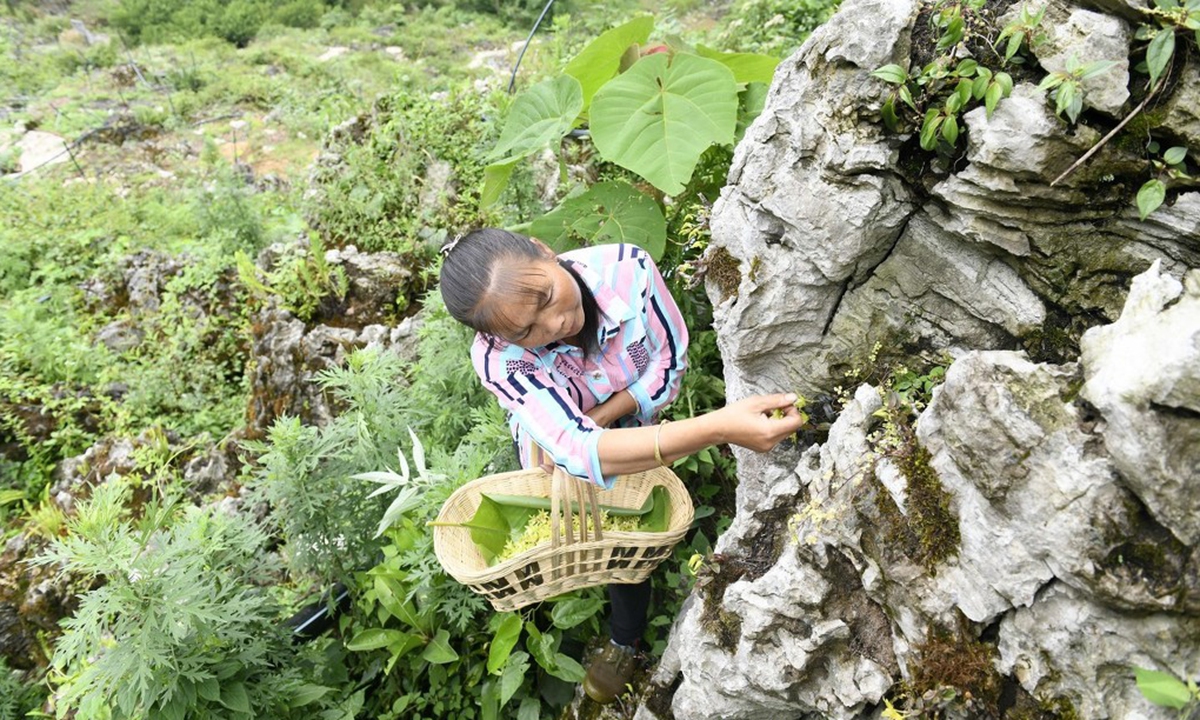
A farmer picks Dendrobium flowers for sale in the deep mountain area in Polao village, Anlong county, Qianxinan Bouyei and Miao Autonomous Prefecture of Southwest China's Guizhou Province. Photo: IC
Tackling relative povertyGT: How do you evaluate China's development over the past few decades from a historical dimension?
Kuhn: China's remarkable development since the beginning of reform and opening-up, sustained for more than four decades, is the epic story of the largest population on earth undergoing the greatest transformation in history. I have been privileged to witness this transforming process firsthand and up close for more than three decades. I consider this long-running opportunity a great gift from the Chinese people to me.
The eradication of extreme poverty in China exemplifies China's developmental miracle, but now that China has eradicated poverty successfully by the end of 2020, what comes next, especially in rural areas?
While rightly celebrating China's historic eradication of all extreme poverty, a monumental accomplishment for the ages, President Xi set immediately to work in redressing relative poverty, recognizing the country's ongoing imbalance between urban and rural areas by calling for "rural vitalization" as "a historic shift" in focusing on agriculture, rural areas and farmers. China has established the National Administration of Rural Revitalization, a new agency to maintain the momentum generated by the State Council Leading Group Office of Poverty Alleviation and Development.
When historians of the future write the chronicles of our times, a feature story may well be China's targeted poverty alleviation.
GT: Recently, some personalities and media outlets questioned that "China's current poverty alleviation standards are lower than the international poverty standards." What's your comment?
Kuhn: China has made an accomplishment of historic importance by eradicating all extreme poverty across the country. But we stress the word "extreme." No one in China claims that the country has eliminated all relative poverty. That's the reason for the transition to rural vitalization, to attack relative poverty by transforming rural areas into desirable places to live and work and raise families. There are also the large issues of the relative poverty of migrant workers and their families in urban areas.
The question of China's standards of poverty versus that of other countries is legitimate and probative. If poverty is defined strictly by disposable income, whether daily, monthly, or annually, then China's criterion is lower than some international standards. However, poverty assessment in China is more complex; it is based on the relative living conditions in China's rural areas, which cannot be measured strictly on the basis of comparative disposable income. Other non-quantitative measures must be included, such as ample and robust food supplies, healthcare and education facilities, and their ease of access; even flush toilets are an important criterion. For many of these non-quantitative criteria, China has made substantial improvements in recent years that are not factored into raw disposable income.
